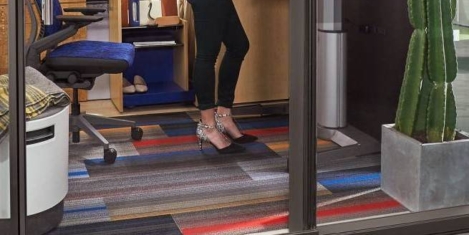July 26, 2017
Putting people at the centre of building design could provide large boost to the economy
 More thoughtfully designed workplaces, centred around people’s needs, could improve performance and help tackle the UK’s productivity gap, according to a new report. Applying design thinking to boost workplace productivity by 5-8 per cent could contribute up to £20 billion to GDP. The potential gain in productivity, equivalent to twice the annual contribution to UK GDP made by the aerospace industry, is revealed in research conducted by researchers from Imperial College London in partnership with Atkins. Atkins commissioned the research to better understand and quantify the economic benefit from human centred design. The research claims to examine the ripple down effect on productivity brought about by an human centred focus on health and wellbeing. This in turn has a benefit for future business growth and can enhance the position of the national economy, according to the report. The research claims to support the importance of employees’ experience of the building in which they work and confirms that steps to create the right working environment can have a material impact on staff productivity and wellbeing.
More thoughtfully designed workplaces, centred around people’s needs, could improve performance and help tackle the UK’s productivity gap, according to a new report. Applying design thinking to boost workplace productivity by 5-8 per cent could contribute up to £20 billion to GDP. The potential gain in productivity, equivalent to twice the annual contribution to UK GDP made by the aerospace industry, is revealed in research conducted by researchers from Imperial College London in partnership with Atkins. Atkins commissioned the research to better understand and quantify the economic benefit from human centred design. The research claims to examine the ripple down effect on productivity brought about by an human centred focus on health and wellbeing. This in turn has a benefit for future business growth and can enhance the position of the national economy, according to the report. The research claims to support the importance of employees’ experience of the building in which they work and confirms that steps to create the right working environment can have a material impact on staff productivity and wellbeing.
























 One in three (34 percent) UK workers are dealing with anxiety, depression or stress, which is affecting their ability to carry out their day-to-day roles, claims a new report. Two in five (39 percent) have taken time off work or reduced their responsibilities because of their health, and of those, 39 percent did not feel comfortable telling their employer about the issue according to the PwC research. Nearly a quarter (23 percent) think their organisation does not take employee wellbeing seriously and more than half (54 percent) work for companies which do not offer health benefits such as counselling, health screening and subsidised gym memberships. The research suggests that Health and wellbeing has a significant impact on performance with four out of five workers (83 percent) believing that their wellbeing influences how productive they are. Pressures such as dealing with customers and clients, and long hours have the biggest impact on workplace wellbeing. The survey respondents also indicated a belief that technology can play a part in addressing health, with almost half saying they would be open to using an app to improve their wellbeing.
One in three (34 percent) UK workers are dealing with anxiety, depression or stress, which is affecting their ability to carry out their day-to-day roles, claims a new report. Two in five (39 percent) have taken time off work or reduced their responsibilities because of their health, and of those, 39 percent did not feel comfortable telling their employer about the issue according to the PwC research. Nearly a quarter (23 percent) think their organisation does not take employee wellbeing seriously and more than half (54 percent) work for companies which do not offer health benefits such as counselling, health screening and subsidised gym memberships. The research suggests that Health and wellbeing has a significant impact on performance with four out of five workers (83 percent) believing that their wellbeing influences how productive they are. Pressures such as dealing with customers and clients, and long hours have the biggest impact on workplace wellbeing. The survey respondents also indicated a belief that technology can play a part in addressing health, with almost half saying they would be open to using an app to improve their wellbeing.







July 24, 2017
Employers have a growing responsibility to provide staff with cycling facilities
by Peter Ferrari • Cities, Comment, Property, Wellbeing
(more…)